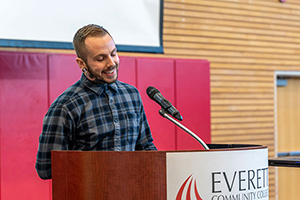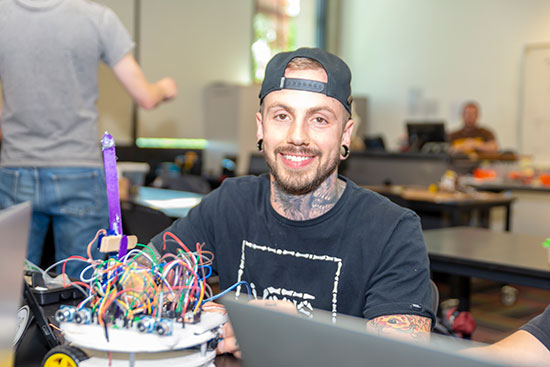Student Spotlight - Raymond Haug
The day he was released from prison, Raymond Haug walked from the bus station to EvCC to register for classes.
He kept his past drug use, homelessness, and time behind bars a secret until he applied for an EvCC Foundation scholarship. He not only earned a scholarship, he was asked to speak about his life at the Foundation breakfast to raise money to benefit scholarships and college programs.
Now a mechanical engineering student, Raymond has received invitations to join academic clubs, mentored students, and was hired to work as a student tutor. "I have found my place and my way out. I no longer hide my past, and I am no longer afraid of my future," he says.
 |
 |
What are you studying at EvCC?
Mechanical engineering. I started out as a nutrition major and then switched my second year. I want to work for a motorcycle race team one day.
Why did you choose EvCC?
It was close to home. The 7 bus route literally went from my street to campus. I needed to do some catch up before I could begin college work. EvCC offers Transitional Studies classes for $25. I was not 100% committed to pursuing a degree, but for that price I had to give it a try. I had nothing to lose. The Transitional Studies math class I needed was offered at night, and this allowed me to continue working while I tested the waters for this school thing.
I chose EvCC, but they chose me back. I have received an EvCC Foundation scholarship for the last two years, been employed as a tutor, volunteered with different clubs, and been invited to the local Phi Theta Kappa chapter and the Honors program here on campus. I came here only hoping to receive a degree. In the process, I was welcomed into an amazing community.
What was EvCC like for you when you first started?
When I first started at EvCC I was very intimidated. I hadn’t been in school in about nine years. I have a lot of tattoos and a rough background, and I felt like I stood out. I learned right away that I wasn’t alone in my age group or school background. George, my first math teacher, was awesome and really took extra time making sure everyone in the classroom understood the concepts before moving on. There were plenty of other adult students in my classes and I began to feel more comfortable. When I first started college, I had also put in an application to a local union. I was tired of working construction though and made myself a promise that if I did well in school, I would turn down the union job. I kept getting As and committed to my future on campus.
How did your EvCC Foundation scholarship help you?
 The EvCC Foundation scholarships helped me pay my bills so I could work less and study more. I typically work around 20-30 hours a week to sustain myself. The first year that I received the Foundation scholarship, I received $1,500 and that covered three months of my rent. I know what debt can do to a person trying to get ahead, so my goal is to keep my GPA up enough to continue receiving scholarships. I would like to borrow as little money as possible to pay for my degrees. Every scholarship I get is that much less I have to earn and that much less stress in the back of my mind. More important to me than the dollars I received, though, was the recognition. I just wrote about my personal life in the essay questions. I told the Foundation about my struggles with addiction, jail, and growing up on the streets. I had always thought these facts separated me from regular society and would hold me back. Things I used to be embarrassed to talk about are now helping me pay for my education and offering hope to not only me, but others like me. I can’t thank the Foundation enough for that feeling of acceptance they gave me.
The EvCC Foundation scholarships helped me pay my bills so I could work less and study more. I typically work around 20-30 hours a week to sustain myself. The first year that I received the Foundation scholarship, I received $1,500 and that covered three months of my rent. I know what debt can do to a person trying to get ahead, so my goal is to keep my GPA up enough to continue receiving scholarships. I would like to borrow as little money as possible to pay for my degrees. Every scholarship I get is that much less I have to earn and that much less stress in the back of my mind. More important to me than the dollars I received, though, was the recognition. I just wrote about my personal life in the essay questions. I told the Foundation about my struggles with addiction, jail, and growing up on the streets. I had always thought these facts separated me from regular society and would hold me back. Things I used to be embarrassed to talk about are now helping me pay for my education and offering hope to not only me, but others like me. I can’t thank the Foundation enough for that feeling of acceptance they gave me.
Who helped you succeed at EvCC? (faculty member, staff). What did that person do to help you?
I really have so many staff to thank. Mark Kontulis was awesome. I took him for my general chemistry series, and it was very challenging. He really pushed me to do my best. Laura Wild was my first advisor and even when I switched majors, she always remembered my name and asked about current academic doings when we passed in the halls. Debbie Newbury and Candace Ronhaar in the Tutoring Center probably think I live there. I would not have made it this far without them. Honestly, I find a staff or faculty member every single quarter that I’m drawn to. Either I’m really lucky, or you guys strictly employ rockstars.
What advice do you have for new EvCC students?
One, use the Tutoring Center. Two, don’t forget to take a few classes that satisfy a curiosity. I think its easy to get caught up in just trying to graduate quickly, and you may miss exposing yourself to a topic you didn’t even know you were passionate about. Third, utilize the clubs and events. There really is an overwhelming amount of support at EvCC they really just want to make sure everyone succeeds. Lastly, a closed mouth doesn’t get fed, so don’t be afraid to ask questions.
What do you plan to do after graduation?
After Everett, I hope to be accepted into the University of Washington engineering program. Eventually I want to work on a motorcycle race team. I love riding bikes so if someone decided to pay me to play with them, I’d be pretty stoked.
Note: In May 2019, Raymond was named a University of Washington Martin Family Foundation Achievement Scholar, which will help fund his education at EvCC and at the University of Washington, after he transfers there in Fall 2020.
Describe the best experience you had at EvCC so far.
Hmm, being a student is the best experience I’ve had in my life so far, so all of it. I dropped out if school in ninth grade, and I always regretted it. Coming back to college in my late twenties I really don’t take any day here for granted. I missed out on so much by skipping high school; I don’t want to look back at my time here and feel like I could have done more.
Anything else you want to add?
I am a recovering drug addict, coming up on four years clean from all substances. Like many people who have struggled with addiction, I have also faced homelessness and the law. I first slept outside at the age of 15 and dropped out of high school shortly afterward. As a runaway, living on the streets, it was difficult to stay out of jail. At the time, I had little hope of living any other way. I spent the first few years of my adult life in different prisons across the state.
During my last year of incarceration, I completed drug treatment classes and came across a packet of papers that would forever change my life, titled Post-Prison Education Program. Hope is a dangerous concept to express or talk about in prison; inmates will harass anyone they find in possession of a dream. I secretly took the packet back to my cell and flipped through the pages. The program, started by ex-convict Ari Kohn, empowers incarcerated inmates to sign up for the FAFSA (Free Application for Federal Student Aid) and register at schools prior to their release. If accepted into the program, they assist with bus fare and books to get recently released inmates started.
I had never really considered college before, but I knew I had to fundamentally shift my life. I filled out the application page and sent it out the next morning. Over the next few months the program administrators and I corresponded and, true to their word, they filled out the FAFSA for me. With focus, there wasn’t anything in the way of me going to school.
My release date came, and I had nobody waiting to pick me up at the gate, so the guards drove me down to the Everett bus station. I had nothing to my name except the gray Monroe Correctional Facility sweatsuit I was wearing and a paper bag with my housing voucher paperwork in it. I walked straight to Everett Community College from that bus station. With my head down, I applied on one of the free computers in the Welcome Center. A week later, I received enrollment confirmation for Fall quarter 2016.
I kept my past a secret and tried to remain anonymous, certain that as soon as they found out where I had been for the last few years, I would no longer be welcome. I also feared that every single class I signed up for would be the one that proved I wasn’t smart enough to stay there - neither of those days came.
I have found my place and my way out. I no longer hide my past, and I am no longer afraid of my future.


